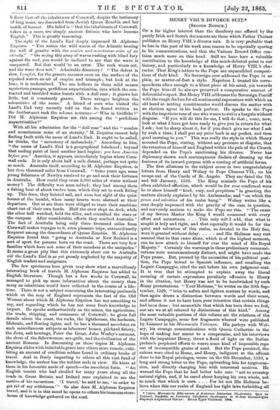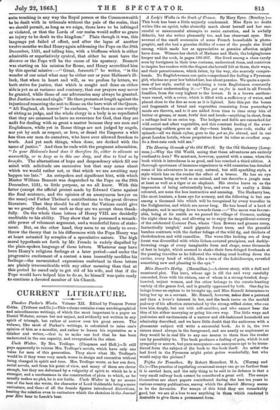HENRY VIII.'S DIVORCE S1JIT.* [SEcorirt Noricts.)
OF a far higher interest than the desultory one offered by the purely Irish and Scotch documents are those which Father Theiner publishes on Henry VIII.'s divorce suit. It is very probable that he has in this part of his work seen reason to be especially sparing in his communications, and that the Vatican Record Office con- tains much more on this head. Still we have here a valuable contribution to the knowledge of this much-debated point in our history, and particularly to a knowledge of Henry VIIL's cha- racter. That King's letters to the Pope are unparalleled composi- tions of their kind. No Sovereign ever addressed the Pope in so plain, so matter-of-fact a style. Napoleon I. treated his corre- spondents often enough to a blunt piece of his mind, yet towards the Pope himself he always preserved a comparative amount of deferential respect. But Henry VILL addresses the Sovereign Pontiff with the rough disdain for all sentimental expressions with which an old hand at netting constituencies would .discuss the matter with an election agent in his back parlour. He speaks to the Pope with the imperious tone of one who wants to strike a bargain without disguise. "If you will do this for me, I will do that ; come, now, look at what I have got here ready to give you in return for what I ask ; but be sharp about it, for if you don't give me what I ask by such a time, I shall put my price back in my pocket, and then good morning to you." This was really the style in which Henry accosted the Pope, stating, without any pretence at disguise, that the retention of himself and England within the pale of the Church depended on the Pope's sanctioning his divorce. Never has diplomacy shown such contemptuous disdain of dressing up the features of its inward purpose with a coating of artificial forms.
The first allusions to the subject occur in two congratulatory letters from Henry and Wolsey to Pope Clement VII., on his escape out of the Castle of St. Angelo. They are dated the 7th. and 8th January, 1528. The King reminds the Pope of his often exhibited affection, which would be for ever confirmed were he to show himself "kind, easy, and propitious" in granting the matters already explained by his Ambassador, and " on which the peace and salvation of his realm hang." Wolsey writes like a man deeply impressed with the gravity of the case in question, and nervously anxious to make the Pope see this. " The cause of my Serene Master the King I would commend with every effort and earnestness. . . . This only will I add, that what is sought is holy and right, and that especially it would be for the quiet and salvation of this realm, so devoted to the Holy See, were it granted without delay and His Holiness may rest assured that in that cause alone, which is of the highest moment, can he now attach to himself for ever the mind of His Royal Majesty." Certainly the warnings in these preliminary communi- cations were unceremoniously distinct, and might have made the Pope pause. But, pressed by the necessities of his political posi- tion, the Pope bowed to Spanish influence, and recalling the Legate Campeggio, cited the suit before his own judgment-seat. It is true that he attempted to explain away the literal meaning of certain expressions peculiarly offensive to Henry in the citation, but Henry was not to be hoodwinked by such flimsy protestations. " Your Holiness," he writes on the 30th Sep- tember, 1529, " tries to soften and lighten matters by words, and then again draws a distinction between words and their sense, and affirms it not to have been your intention that certain things had been done ; but meanwhile that which has been done we feel, nor are we at all relieved by distinctions of this kind." Among the most valuable portions of this volume are the relations of the Legate Campeggio, some few fragments whereof were published by Dimmer in his Monumenta Vaticana. His parleys with Wol- sey, his strange communications with Queen Catherine in the hope of making her assent to a compromise, and his interviews with the impatient Henry, throw a flood of light on the Italian prelate's perplexed efforts to weave some kind of impossible rope out of incompatible grains of sand. But the Pope persisted, the suitors were cited to Rome, and Henry, indignant at the affront done to his Royal privileges, wrote on the 6th December, 1530, a long and strong letter to the Pope, upbraiding him for tergiversa- tion, and directly charging him with interested motives. He warned the Pope that he had better take care " not to overstep natural rights, and, if he cared about keeping his own whole, not to touch that which is ours. . . . For let not His Holiness be- lieve when this our realm of England has tight laws forbidding all
• Velem Monumeaa Hibettlorum et Seotorum Historiam Blostrantia. Quo or Vatlesui, NespolJA as Fioretitite Tabulariis deprolupsit et 0.dine Chrouologica dispoeuit Augustiuus The.ne Roasts Typis Vaticauis. 1864. suite touching in any way the Royal person or the Commonwealth to be dealt with in tribunals without the pale of the realm, that we should permit, as long as we reign, those laws to be infringed or violated, or that the Lords of our realm would suffer so grave an injury to be dealt to the kingdom." Plain though it was, this language yet failed of effect, and after the lapse of another twelve months we find Henryagain addressing the Pope on the 28th December, 1531, and telling him, with a bluffness which is either admirable or superlatively cynical, that either he must have the divorce or the Pope will be the cause of his apostacy. Bennett was starting on his mission for Rome, and Henry accredited him by this special missive : —" Great, forsooth !" he writes, " is the wonder of our mind what may be either our or your Holiness's ill- luck, that when in heart and will, as we profess by letters, we both strive for justice, that which is sought and done on either side is yet so at variance and contrary, that our prayers may never be granted, while those of our adversaries may always be granted. But Justice is one and single." He then protests at length against the injustice of removing the suit to Rome on the bare wish of the Queen. " All England, oh horror !" he exclaims, " has thus no one worthy of sitting as judge, and the whole clergy in a body is so repudiated that they are esteemed to have no reverence for God, that they are unfit for dealing with so great a matter because they are men and Englishmen, while yet in Rome things are not judged by angels, nor yet by such as respect, or love, or dread the Emperor a whit less than our men do ourselves, who have ever allowed freedom to truth. And yet such things, when done, are decked with the name of justice." And then he ends with the pregnant admonition, "In your Holiness's hand does it therefore lie, either to alienate us unworthily, or to keep us in this our duty, and thus to bind us by benefits. The alternations of hope and despondency which fill our mind with solicitude are successive lest that may come about which we would rather not, or that which we are awaiting may happen too late." An outspoken and significant hint, with which Master William Bennett was despatched to the Pope on the 28th December, 1531, to little purpose, as we all know. With this letter (except the official protest made by Edward Came against the final sentence, and the opinion of an anonymous lawyer on the same) end Father Theiner's contributions to the great divorce literature. That they should be all that the Vatican could give us we greatly doubt, but such as they are we accept them thank- fully. On the whole these letters of Henry VIII. are decidedly creditable to his ability. They show that he possessed a remark- able power of vehement argument, and a wonderful force of state- ment. But, on the other hand, they seem to us clearly to over- throw the theory that in his differences with the Pope Henry was at heart actuated by scruples of a speculative nature. The high moral hypothesis set forth by Mr. Fronde is rudely dispelled by the plain-spoken language of these letters. Whatever may have been Henry's religious feelings at a later period—and under the progressive excitement of a contest a man insensibly modifies his feelings—the unvarnished expressions enshrined in these letters are plainly irreconcileable with any other meaning than that at this period he cared only to get rid of his wife, and that if the Pope would have helped him to do so, he himself was quite ready to continue a devoted member of his Church.































 Previous page
Previous page